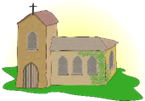Church Records Hold the Keys
 Most of our ancestors had church affiliations. The records of these religious bodies can give us family information that we cannot find anywhere else.
Most of our ancestors had church affiliations. The records of these religious bodies can give us family information that we cannot find anywhere else.
This weekend our Colorado Genealogical Society will offer a program entitled Faith of Our Fathers by Sylvia Tracy-Doolos to help us locate these records. I will tune in to see what new information I can learn about this type of research.
I have used church records in the past, when I can find them. They have provided me with information on several branches of my ancestors:
- The Lutheran Church was the state church of Norway, and all residents had contact with it in some way or another, even if they were dissenters (Catholics, Quakers, etc.). Norway has put their religious records online, free of charge, at https://www.digitalarkivet.no/en/. Using this site, we have traced our Norwegian families back until church records began in Norway, shortly after the Reformation.
- As in Norway, the Lutheran Church was the state church of Finland. Family Search has digitized many of the Finnish church records. They were kept in two languages, Finnish and Swedish, because Finland was part of the Kingdom of Sweden from the 12th century until the Napoleonic Wars. I have struggled to decipher these records and was grateful to find a Finnish relative who had already done much of the work.
- Since I learned last year that I have an Irish Catholic great-grandfather, I have sought Catholic records for him and his family. I have had mixed results with access. In the United States, the Diocese of Springfield allowed Family Search to film their records, and they are easy to use. The nearby Diocese of Peoria restricts access and will not even do lookups—a disappointing dead end. My husband/tech advisor needed information on his German Catholic family from the Diocese of St. Louis, but for many years they would provide only a transcription. When we finally got our hands on the original record, we learned they had erred in the transcription, sending us on a fruitless search for a non-existent person.
- Ancestors in my other lines belonged variously to the Baptist, Congregational, and Methodist denominations. I learned this about them because they were buried in church cemeteries. With one exception, I have not found any other church records for these ancestors. The one Methodist record I located was a digitized record of my second great-grandfather Thomas Sherman’s marriage to Mary Scott in Edgar County, Illinois in the 1870s.
For those with German ancestors, one valuable source is Roger P. Minert’s German Immigrants in American Church Records series. I checked the volume for Indiana looking for the first marriage of Thomas Sherman, mentioned above. Family lore tells us he married a Stilgenbauer near Indianapolis during the Civil War, but I found no record of this marriage in either Minert’s book or the civil register.
The records for Protestant denominations can be tricky to locate, if they exist at all. They did not have central repositories. I wonder if Sylvia Tracy-Doolos will have any new insights to share on this type of research.